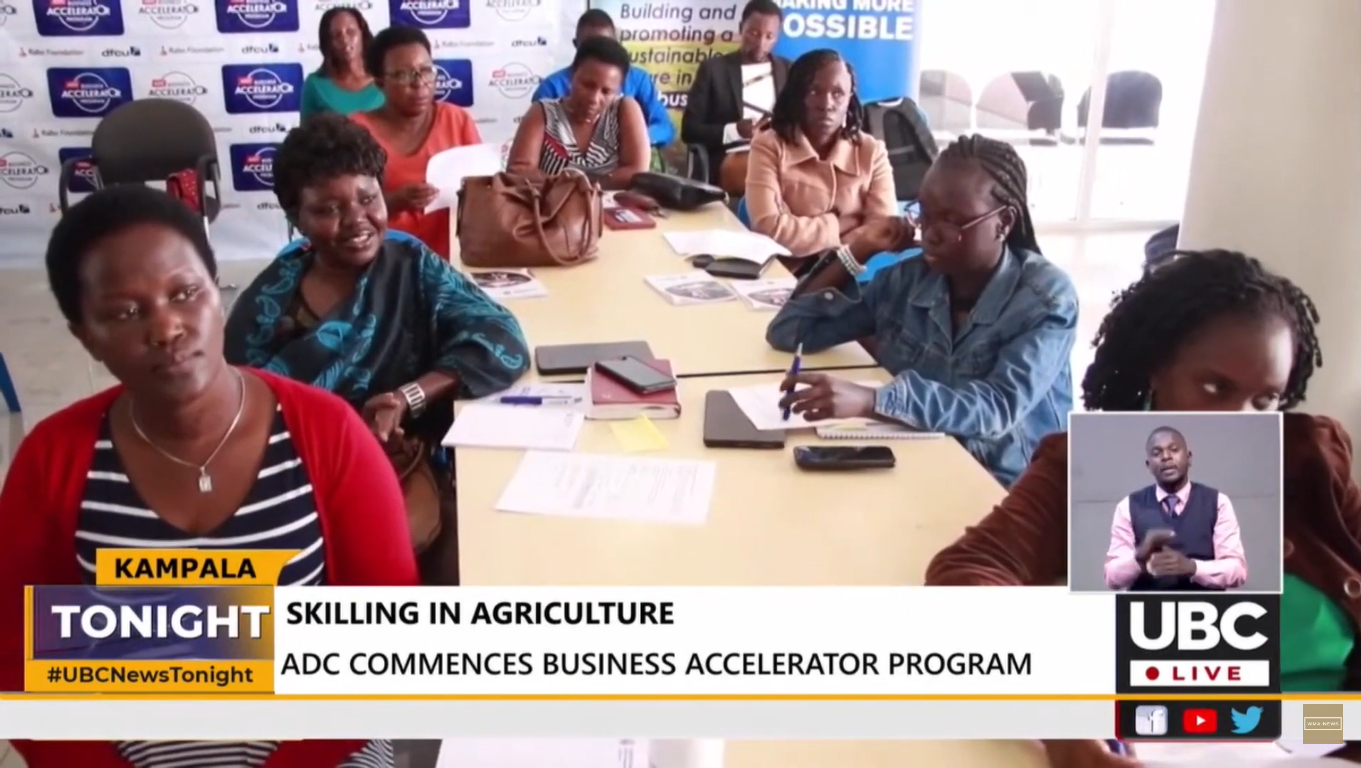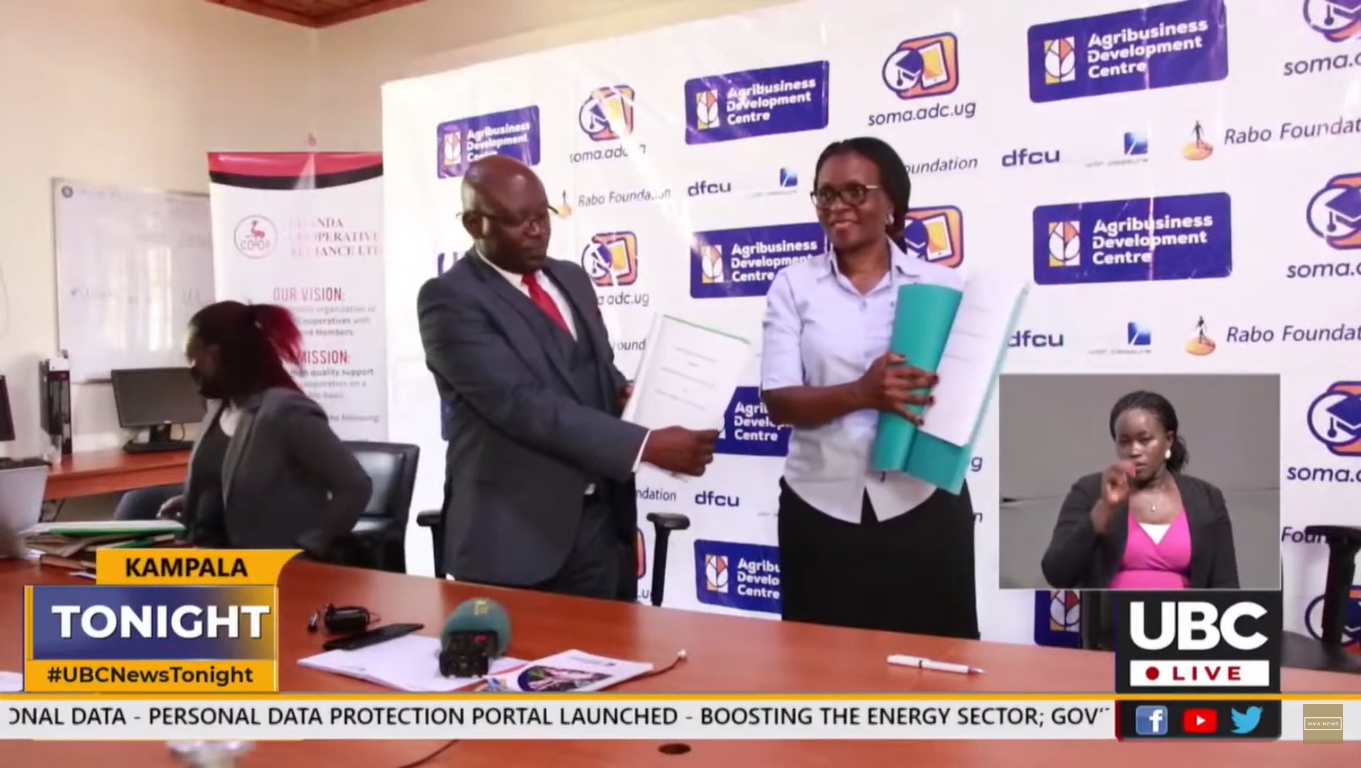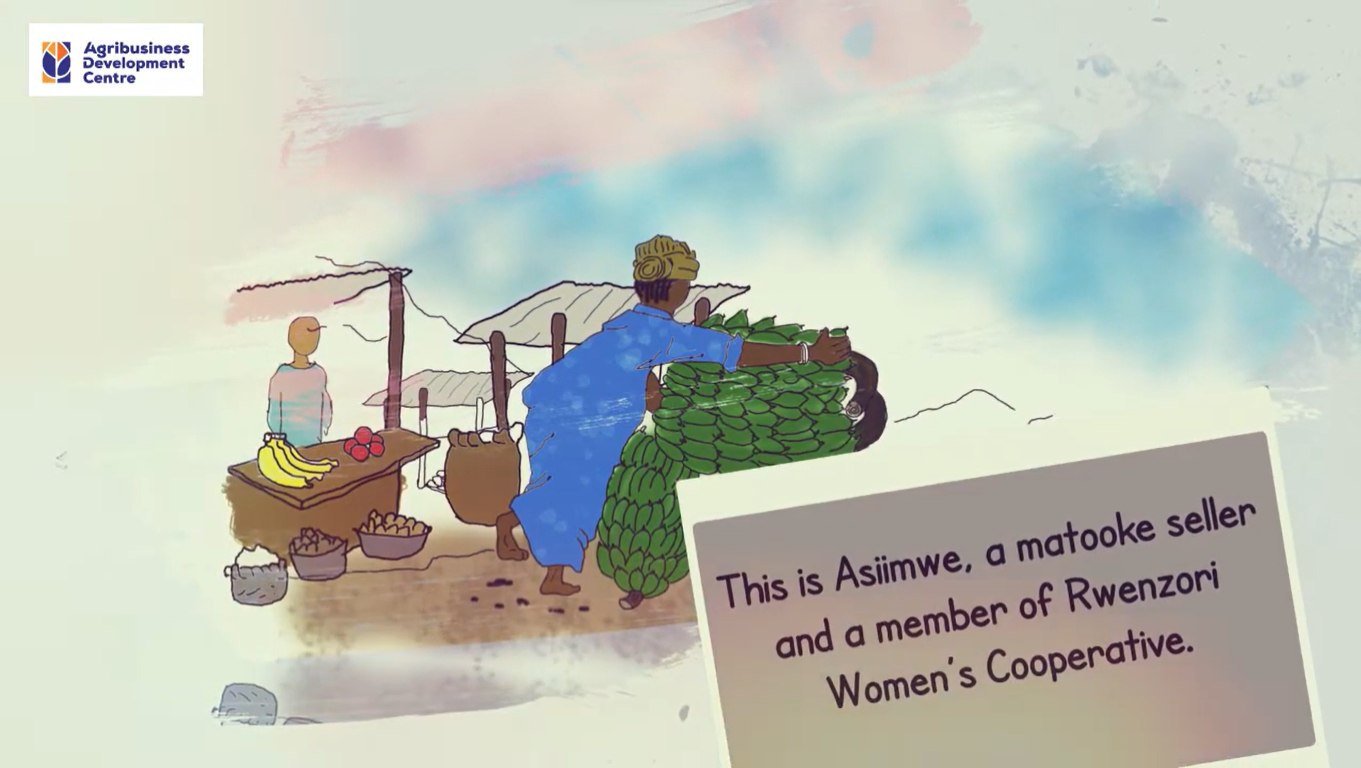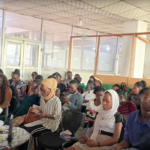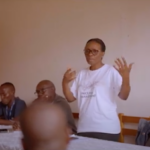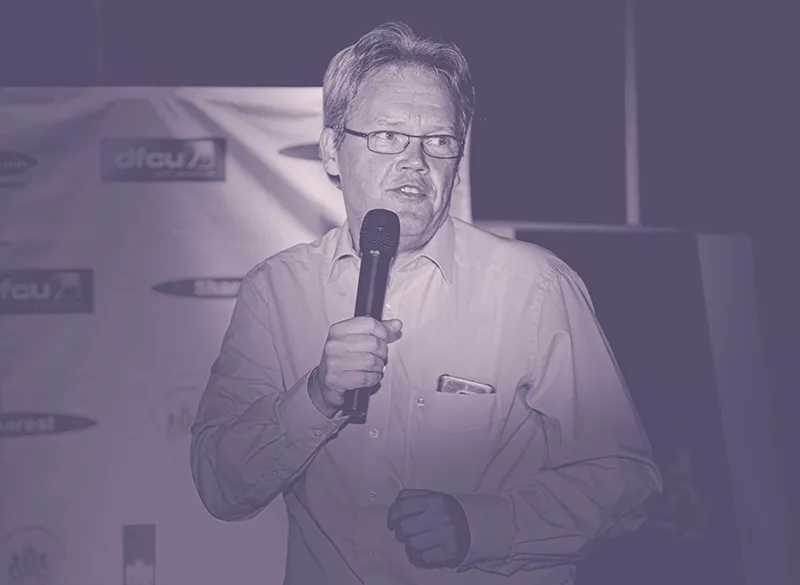
Meet our new Board Chairperson – Paul Van Apeldoorn
In late March of this year, Paul Van Apeldoorn became the Board Chairperson of ADC. He currently works with Rabobank Wholesale & Rural Department and has previous experience in Uganda, having worked with dfcu as Executive Director and Chief Transformation Officer. Additionally, he was one of the initial Board members of ADC when it was established by Rabo Foundation and dfcu Limited in 2017 to foster agribusiness bankability.
While on his visit, he engaged with key stakeholders to gather insights on our interventions and met with the ADC team to gain a deeper understanding of our processes and capabilities. By physically connecting with our team and experiencing their work environment, he was able to encourage them to leverage our strengths – which stem from our founders, ownership structure, and collective industry experience – to maximize our potential.
During his visit, we had a chance to sit down with him.
Congratulations on your new position as the Board Chairperson of the Agribusiness Development Centre ADC! Please introduce yourself and share with us a little bit about your background and experience.
Thank you! My name is Paul Van Apeldoorn, and I work with Rabobank Wholesale & Rural Department. I am familiar with Uganda, having worked with dfcu as Executive Director and Chief Transformation Officer some years ago. I was also one of the inaugural Board members of ADC when it was founded by Rabo Foundation and dfcu Limited in 2017 for the purposes of promoting agribusiness bankability.
What strategies do you envision could steer ADC towards being the preferred Business Development Services Partner in promoting Agricultural Transformation in Uganda?
Last year, ADC launched her Strategic Plan under the Stewardship of my predecessor, Ms. Madelon Pfeiffer (the Chair of ADC then), and two key strategic objectives to be highlighted here are:
- Sustaining ADC’s operations both at institutional and partner level
- Growing ADC’s Business Innovatively as the only way to scale operations
Of course, the above two require opening up to more collaborative approaches than we had in the past, and we have, to date, worked to bring over four such partnerships on board.
How do you plan to engage with key stakeholders?
I have already commenced engaging key stakeholders through a series of meetings, but also, within our Annual Workplan, we have scheduled events that my colleagues and or myself shall attend in collaboration with partnerships made and prospected.
Finally, what message would you like to send to the team at Agribusiness Development Centre?
My visit allows me to get a good appreciation of our interventions, how we go about them and the potential we have as team ADC. More importantly, it allows me to touch base with the team physically, better appreciate their working environment and encourage them to leverage our key strengths by nature of our founders/structural ownership and combined experience in the sector to fulfil our potential.
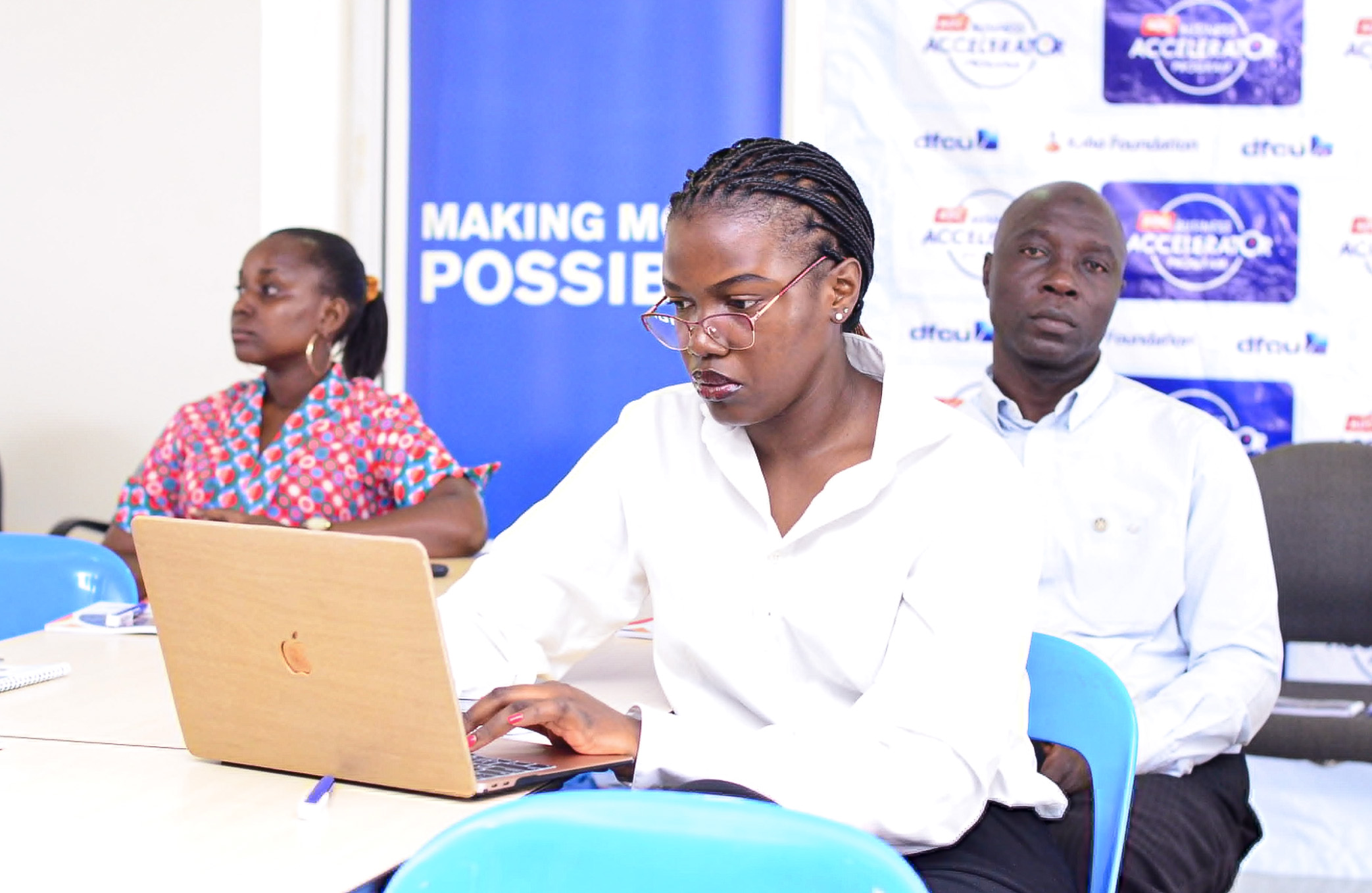
Training of agribusiness women entrepreneurs kicks off in Kampala
The training sessions for the first group of entrepreneurs in agribusiness has kicked off following the successful launch of the Business Accelerator Program.
Business Accelerator Program, a brainchild of the Agribusiness Development Centre (ADC) powered by dfcu limited and Rabo foundation will help Agribusinesses to get out of the ideation phase and offer them a business acceleration opportunity.
Ruth Asasira, the manager women in of Business and special programs said the program is aimed at supporting and empowering entrepreneurs in the Agri-business in the country. The business Acceleration Program (BAP) targeted for women-led agribusinesses will build their capacity and investment readiness to access financing from investors and financial institutions.
“We are working to ensure sustainability in the agribusiness space. Look for and address challenges affecting women in business. This cohort is aimed at reaching out to enterprises led and owned by women in the agribusiness space. The Agribusiness, we mean the whole value chain from production, processing, marketing, supply chain, export and others,” she said “We shall help the participants understand the basic management of agribusiness, the risks involved and mobiles capital and financing and market linkages for them. We are looking at empowering entrepreneurs and their agri-businesses; create an enabling environment that can facilitate financing for their businesses and other practices like good governance that can influence the growth of their businesses,” she said
William Sekabembe, the Bank’s Chief Commercial Officer said, “dfcu has made investments in capacity building programs that are customized to address the unique challenges commonly faced by women entrepreneurs. We have also created opportunities and access to funding.”
Since the inception of the Women in Business Program has registered over 80,000 women and positively impacted over 30,000 more. When dfcu Rabo Bank set up the Agribusiness Development Center, our goal was to create self-sufficiency.
The program will enable 350 agribusinesses to become self-sufficient and create at least 350 new jobs, Link at least 50 percent of these agribusinesses to affordable Green Financing, technical assistance and markets.
She said for the next two years, the programs will be held under the themes which include; key value chains; greening agribusinesses; Oil and Gas opportunities for Agribusinesses; Youth in agribusiness with the first cohort premised on a theme of gender inclusivity in agribusiness development.
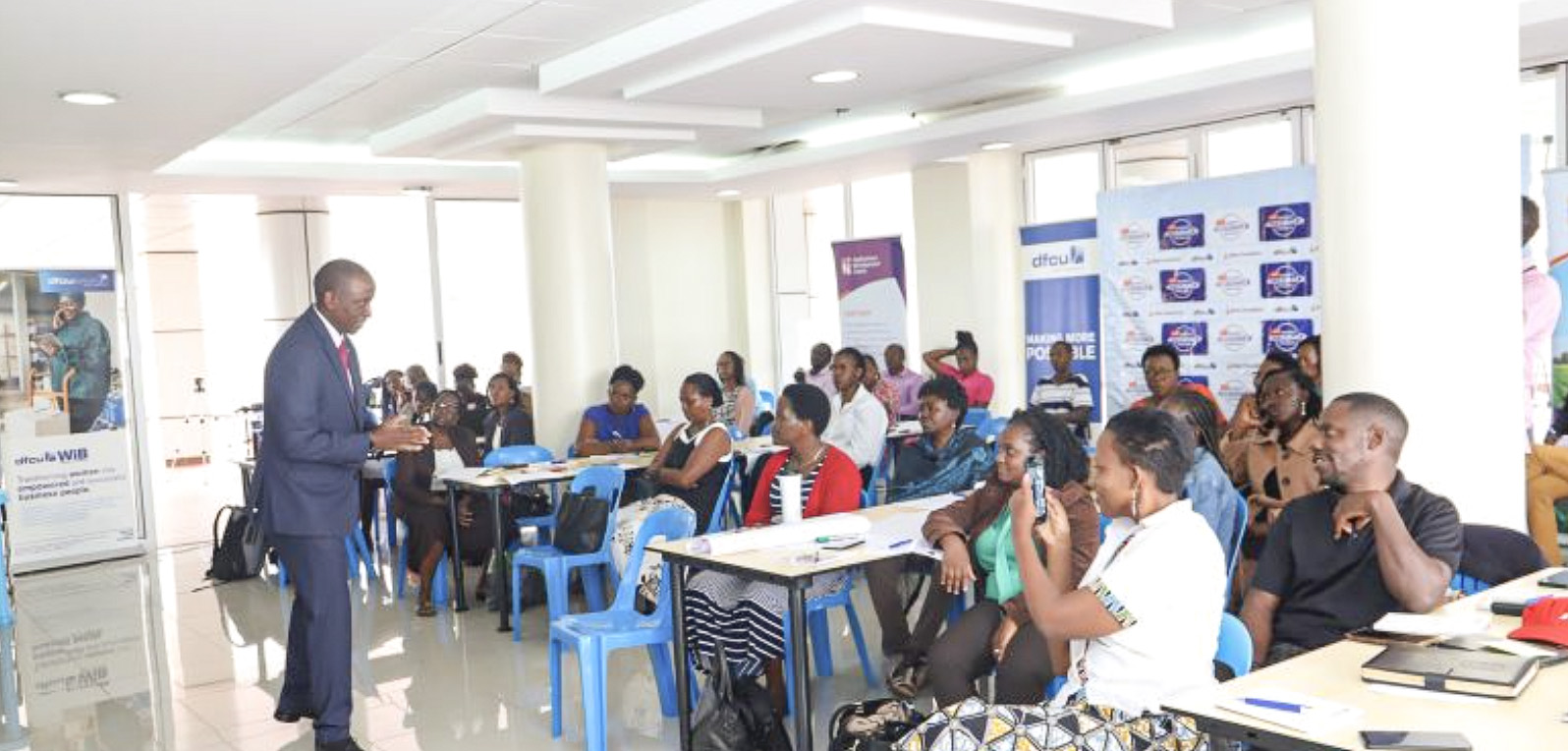
Over 30 women-owned agribusinesses Begin Skills-Training
Following the successful launch of the Business Accelerator Program (BAP), dfcu Bank and the Agribusiness Development Center (ADC) have officially this morning kicked off training of the first cohort of the Program’s successful business owners.
Attended by over 30 Women-owned agribusinesses, the event was officiated by William Sekabembe, dfcu Bank’s Executive Director and Chief Commercial Officer.
A brainchild of The Agribusiness Development Centre powered by dfcu limited and Rabo Foundation, the Business Accelerator Program is a 4-month program focused on the growth of agribusiness enterprises that have moved from the ideation stage and are ready for scale.
The program seeks to enable 350 agribusinesses (40% women-led) to become self-sufficient & create at least 350 new jobs in the following categories: Agro Marketing, Processing, Production; Agro Forestry; Agro Tourism and Agri- support services like Agritech; Veterinary; Input supply; Extension Service.
The training, which shall run for 4 months starting today (11th October 2022), will utilise a visual modelling method known as The Business Model Canvas (BMC) – an excellent strategic management thinking tool that helps entrepreneurs in planning and developing new or redesigning existing business models – to build competitive business models.
At the end of the 4 months, the participants shall have acquired among others, the skills & tools to support in Business strategic positioning & Business model validation, Branding, Accounting and Tax Advisory as well as Linkages to affordable financial services.
Addressing the participants, dfcu Bank Executive Director and Chief Commercial Officer William Sekabembe noted that Business Acceleration Program (BAP) will build the capacity and investment readiness of its beneficiaries, enabling them to access financing from investors and financial institutions.
“Literature shows that women in Uganda make up to 52% of the labour force and are an important talent to help Uganda meet its development goals, especially in entrepreneurship and micro, small and medium enterprises growth. However, it is generally known that women face more challenges than men in starting, managing, and growing their enterprises as they are more likely to be impeded by a lack of the necessary capacities, skills, and resources. To this end, dfcu has worked closely with ADC to create a Business Accelerator Program whose main objective is to support businesses like yours to improve and attract the necessary market and financial linkages for growth and sustainability,” he said.
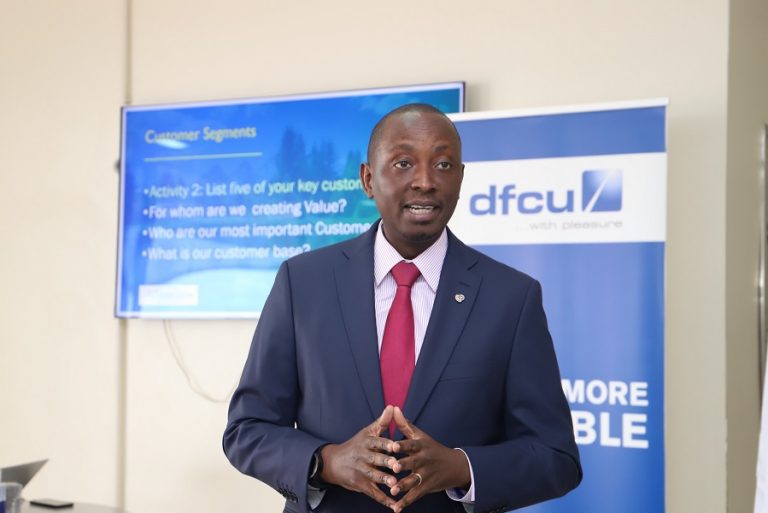
“Since its inception, dfcu Bank has made continuous commitments to support a wide base of customers that include SMEs, women entrepreneurs, Investment Clubs. The Bank’s Women in Business Program proposition which among others, serves women employed in agribusiness as a key focus area has registered over 80,000 clients with over 25,000 of them benefiting from the capacity building sessions and over 6,000 women accessing financing through the dfcu WiB loans,” Sekabembe added.
The Business Accelerator Program alumni will also benefit from the dfcu Bank Small and Medium enterprise (SME) agribusiness value proposition which includes affordable transactional banking, financing as well as other capacity building programs.
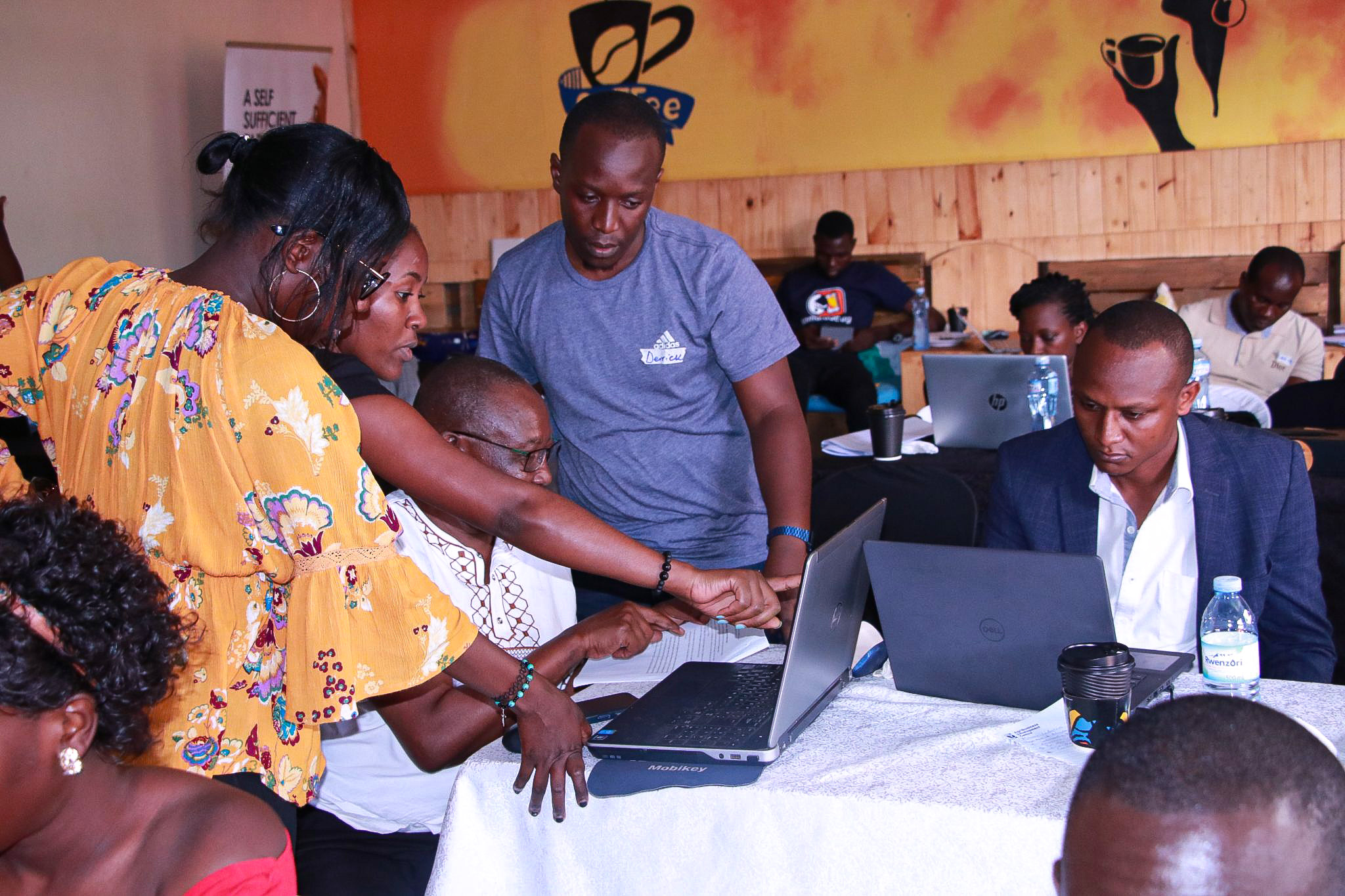
Coffee farmers undergo Price Risk Management training
In response to the demands of farmers and exporters of coffee and cocoa, the Agribusiness Business Development Centre (ADC) and SEATINI have just finished two days of training on price risk management. ADC hosted 40 representatives of farm-based organizations from various parts of the East, West, and Central regions. The training focused on the market fundamentals of demand and supply.
The participants of the training had a chance to get an in-depth market analysis from the ADC business advisors, who emphasized the need for traders to always give updates on the ground with respect to logistics management to earn the trust of their contractors.
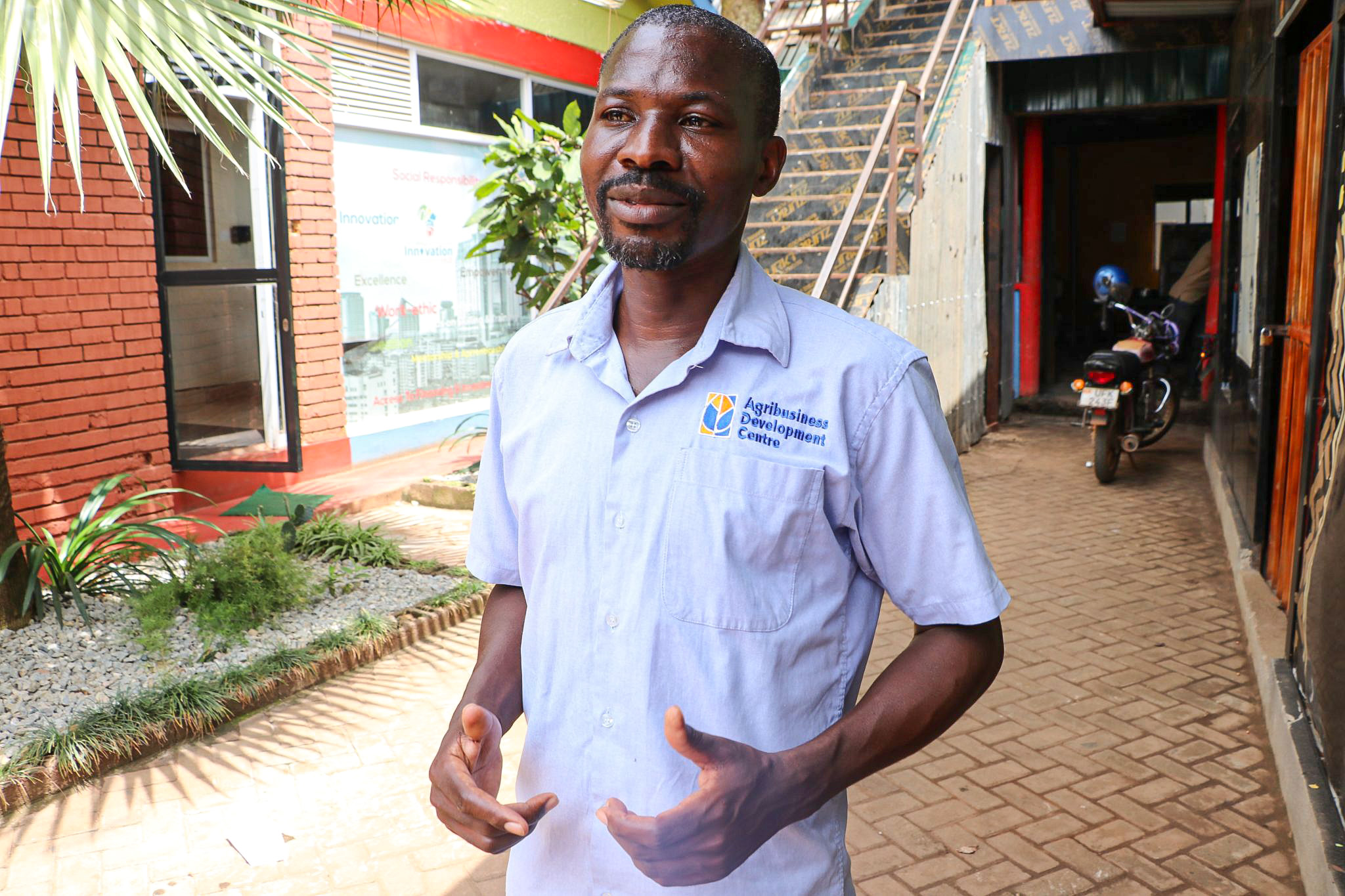
Roland Ainebyona, ADC Business Advisor (West)
Roland Ainebyona Rwambuka business advisor ADC,” The farmers are exposed to a number of risks both internal and external. This training is to enhance their capacity to come up with strategies and tools to use to mitigate the risks to improve their efficiency. There is no business without risk therefore the role of the farmers is to be well prepared to mitigate these risks. The world coffee production for 2022/23 is forecast to rebound by 7.8 million bags from the previous year to 175 million, due primarily to Brazil’s Arabica crop entering the on-year of the biennial production cycle.
Brendah Akankunda from SEATINI, who is the main partner during this PRM training, says, “Their main concern is to make sure there are fair prices for the farmers, there are no violations of rights along the value chains, but importantly to encourage value addition because Uganda has been trapped at the lower end of the chain.”
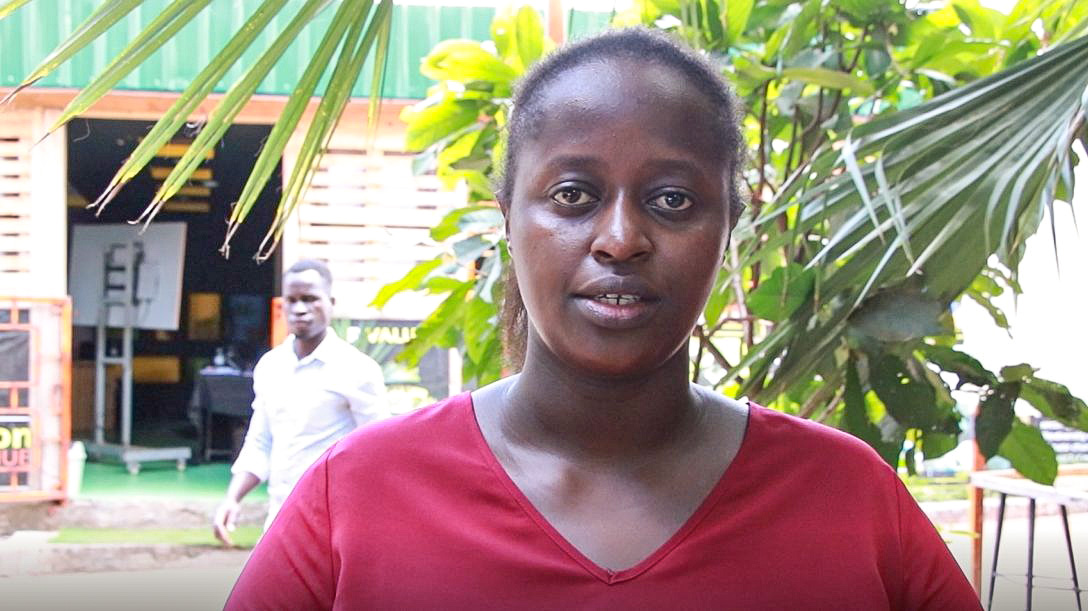
Brendah Akankunda from SEATINI
Throughout our various engagements with stakeholders, we have seen the need for capacity building and this training is addressing that” The main objective of ADC’s work is to make agribusiness self-sufficient and profitable.
Nassaga Investment Ltd.’s Wataaka Charles tells the story of how their coffee was rated as the best but was not being sold on the global market.
“For me, I am a typical farmer which means I understand things at a local level, and yet as a leader of the organization, I need to be getting market for the coffees that we are producing. We were operating like an island but during the first training of the ADC, opened my eyes to how to negotiate for international markets and learnt how to coordinate and network with other coffee producers, in fact from the training in March, we got a buyer who desired to buy our coffee and we were to negotiate and understand the incoterms that secured us a good deal.” I appeal to the ADC and SEATINI with other stakeholders to expand this training to our regions.
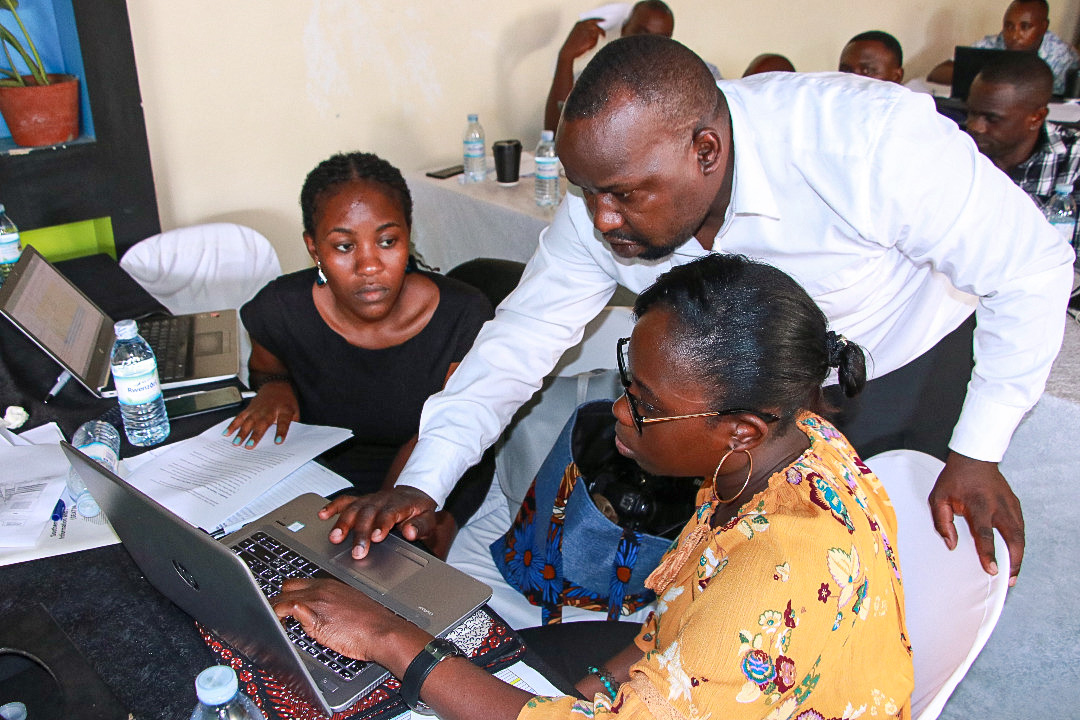
Wilber Kayonga, ADC Business Advisor (West-Albertine Region)
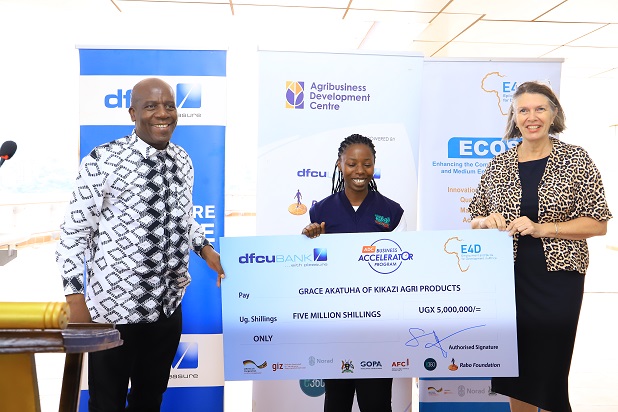
36 Agribusiness Entrepreneurs Graduate With Crucial Skills From ADC’s Business Accelerator Program
At a momentous event held on Friday, 36 Agribusiness entrepreneurs celebrated their graduation from the 2nd and 3rd cohorts of the Business Accelerator Program (BAP). This transformational program, implemented by Agribusiness Development Centre (ADC) in collaboration with GOPA Worldwide Consultants and powered by dfcu Limited and Rabo Foundation, aimed to equip participants with essential business skills and mentorship to drive investor attractiveness, optimize operations, enhance marketing, and seize networking opportunities.
Launched in February 2023, the 2nd and 3rd cohorts of the Business Accelerator Program saw active participation from 110 participants representing 59 enterprises. Throughout the intensive training and mentorship sessions, the program focused on propelling agribusinesses from ideation phase to sustainable growth, ultimately attracting markets and funding for their operations.
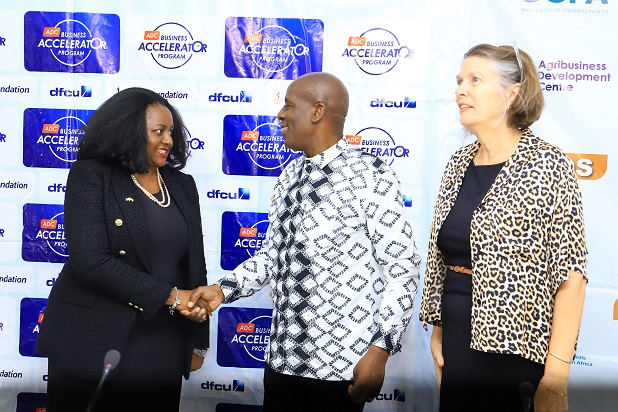
ADC, in partnership with dfcu Limited and Rabo Foundation, initiated the Business Accelerator Program in 2018, seeking to support agribusinesses in unlocking their full potential and fostering growth and sustainability. The recent graduation ceremony at dfcu Bank’s Head Offices in Nakasero marked a significant milestone in the entrepreneurs’ journey towards success.
Addressing the graduates as the guest of Honor, Geraldine Ssali Busuulwa, the Permanent Secretary of Uganda Ministry of Trade, Industry, and Cooperatives, emphasized the importance of returning to the cooperative model to facilitate mass production. She encouraged investment in decontamination technology and improved packaging for agricultural products, while stressing the need for affordable credit access to ensure sustainable growth for farmers.
Ms. Josephine Mukumbya, the Executive Director of ADC, expressed her gratitude to all stakeholders, including GIZ, GOPA Worldwide Consultants, ECOS (funded by GIZ), and dfcu Bank, for their invaluable partnership and unwavering support in empowering agribusinesses to achieve their growth objectives.
Speaking at the award event, Charles Mudiwa, CEO of dfcu Bank, underscored the significance of investing in agribusiness to secure food supply for humanity. He encouraged entrepreneurs to think of large-scale production and emphasized the need to find markets for their products.
Mudiwa also challenged the entrepreneurs on the issue of finding markets. He mentioned that in addition to financing agricultural projects, dfcu has recently announced a partnership with Rabo Bank and Master Card to create a platform for agribusiness entrepreneurs to have access to markets for their products. Mudiwa also highlighted dfcu‘s recent partnership with Rabo Bank and Mastercard, which will create a platform for agribusiness entrepreneurs to access markets and further their growth. He said, “It is important to invest in Agribusiness because food supply is very important for the existence of humanity.”
He further highlighted that it is important for farmers to think of large-scale production saying, “It is good to start small, but we have to grow and become big producers.”

Karim Boven, the ADC patron, and Ambassador of the Kingdom of Netherlands commended the pivotal role of farming in wealth creation and propelling Uganda’s economy to new heights. dfcu Bank has a long history of supporting the agricultural sector as evidenced by its diverse initiatives, such as Harvest Money, Best Farmers Awards, and patronage of the Agribusiness Development Centre. The Bank has forged strategic partnerships with Mastercard, Rabo Partnerships, the Royal Dutch Embassy, Aceli Africa and GOPA – to drive skilling of its staff as well as various players in the agribusiness value chain.
Through these initiatives and partnerships, dfcu Bank continues to pave the way for a sustainable and prosperous future for Uganda’s agricultural landscape.

Agribusiness Development Centre Launches a Business Accelerator Program (BAP)
Agribusiness Development Centre powered by dfcu limited and Rabo foundation has today launched a Business Accelerator Program (BAP) that will attract Agribusinesses getting out of ideation phase and offer them a business acceleration opportunity which should enable these enterprises to attract markets and funding for growth and sustainability of their operations.
BAP will enable 350 agribusinesses (40% women-led) to become self-sufficient & create at least 350 new jobs, Link at least 50% of these agribusinesses to financing and markets.
The program aims to link at least 50 of these businesses to affordable Green Finance and technical assistance. The objective of this partnership is to be able to collectively contribute directly to the five SDGs: 5- Gender equality; 7 – Affordable Clean Energy; 8-Decent work and economic growth; and 17- Partnerships for goals.
Mathias Katamba, dfcu Bank CEO noted that dfcu has worked closely with ADC to create the Business Accelerator Program whose main objectives is to support business improvements and facilitate the necessary linkages for growth and sustainability.
“Since its inception, dfcu Bank has made continuous commitments to support a wide base of customers that include; SMEs, women entrepreneurs, Investment Clubs. Our partnership with ADC is part of a joint mission to grow, build and promote the prospect of a sustainable future. Agribusiness is the future of Uganda, and this partnership will help us continue to fulfill our commitment to serve and build this sector.”
The program cohorts shall be thematic to consider varied hindrances to agribusiness growth as well as harness opportunities for business acceleration. The themes under consideration over two years, shall be; key value chains; greening agribusinesses; Oil & Gas opportunities for Agribusinesses; Youth in agribusiness with the first cohort premised on a theme of gender inclusivity in agribusiness development.
“We hope to Influence youth& women inclusivity in the leadership of at least 50% businesses at the end of the program. The learners will also be exposed to peer and networking opportunities through learning visits to experts in varied fields.” Josephine Mukumbya, Executive Director, ADC.
Why the “Women in Agribusiness” as the first cohort?
Women make up to 52% of the labour force and are an important talent to help Uganda meet its development goals especially in entrepreneurship and micro, small and medium enterprises growth. However, it is generally known that women face more challenges than men in starting, managing, and growing their enterprises as they are more likely to be impeded by a lack of the necessary capacities, skills, and resources. They are more disadvantaged than men due to legal impediments and others.
Therefore, a Business Acceleration Program (BAP) targeted for women-led agribusinesses will build their capacity and investment readiness to access financing from investors and financial institutions.
Promoting entrepreneurship and innovation coupled with the growth of Agri-SMEs will help women develop greater economic prosperity. With the training experience and unique position of ADC having dfcu Limited and Rabo Foundation as their member partners, we believe it will open more opportunities for the women led agribusinesses under the first cohort which is now open on all online channels of ADC and dfcu.
Application submission:Eligible candidates should submit their applications by using the special form available on websites: www.adc.ug/ www.dfcugroup.com or use link www.soma.adc.ug/bap to provide the following information/documents.
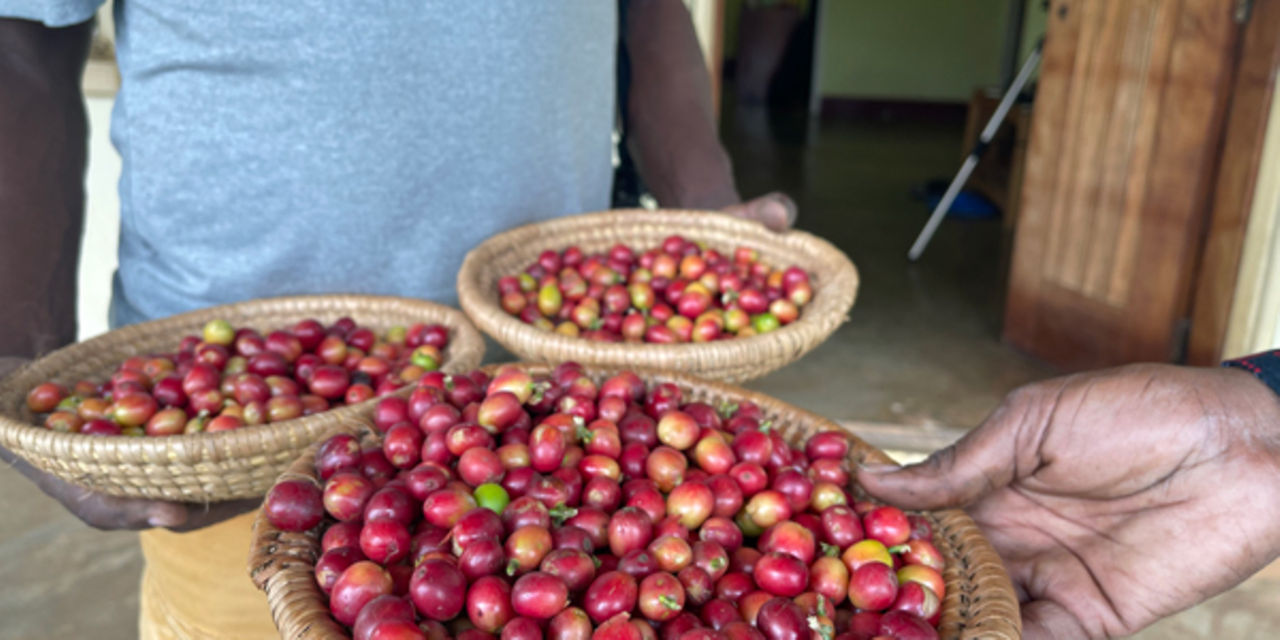
UCDA equips farmers with coffee export skills
Coffee business has been in the news lately. Stakeholders in the coffee sector met at Coffee City in Ntinda a Kampala suburb to deliberate on ways local players can bolster their participation in the sector.
“Over time, our coffee sector has become dominated by multinationals. They control 80 percent of the coffee export volume and Ugandan cooperatives control 10 percent volume. We have organised the price risk management workshop to address that and see how Ugandan organisations and cooperatives can improve the export market,” says Wilber Kayinga, a business advisor at Agribusiness Development Centre (ADC), a farmer based organisation that promotes sustainable agriculture.
Farmers and cooperatives members were equipped with monitoring skills and how best they can secure good contracts, fix good prices and export to big buyers on the international market.
Export figures
According to James Kizito- Mayanja, the Uganda Coffee Development Association’s (UCDA) market intelligence and information officer, the country exported 6.1 million 60 kilogramme bags in green form.
Uganda has two coffee seasons, in March/April and in September. The major take-aways from the workshop for Stephen Mugoya, a finance manager with Ankole Coffee Producers Cooperative Union in Kabwohe, Sheema District, were the importance of coffee farmers sharing experience on how the seasons went because the September season was a competitive one.
“There was stiff competitive for the crop. We have also learnt from each other on strategies we need to take to mitigate risks of trade in coffee. I am confident of leaving richer because I have been contacted of local and international buyers. The facilitators training us do a lot of research and benefit from their knowledge of what global trends are,” Mugoya explains.
Export promotion
President Museveni has tasked UCDA which is mandated to promote and add value to the beverage, to up the exportation volumes to 20 million 60 kilogrammes bags.
Uganda exports the graded green coffee berry. According to the International Coffee Organisation (ICO), an intergovernmental organisation for coffee, global exports of green beans in March 2022 totalled 11.79 million 60kg bags, compared with 11.48 million bags in the same month of the previous year, up 2.6 percent.
The Brazilian Naturals and Robustas were the main forces behind the increase, shipping 3.58 million bags and 4.65 million bags of green beans in March 2022 as compared with 3.44 million bags and 4.31 million bags in March 2021, respectively, up 3.9 percent and 7.8 percent.
80 percent of the coffee produced in Uganda, is Robusta and 20 Arabica. Robusta coffee is of high value and popularly blended by top roasters around the world given its rich aroma.
Market intelligence
According to Mayanja, they are in the process of profiling coffee as per the district or area it is grown just the way Ethiopians do as a way of attracting and attaching a higher price.
At a recent training workshop on price risk management organised under the auspices ADC, Kizito’s two cents were the need to build and strengthen cooperatives.
Markets are driven by prices and for any business, there is some level of risk but the farmer or anyone in coffee business would need to know how to deal with or avert risks should they encounter them.
Mugoya, says that sharing strategies will go a long way in mitigating risks of trade in coffee.
Agronomy
In establishing a coffee farm, UCDA advises that a farmer needs to space the trees, Robusta plants is 10 feet by 10 feet and between Arabica ones is eight by eight feet.
You are then required to dig the right size of holes – two by two feet long and wide and four feet deep. While digging holes, heap the top soil on one side and bottom soil on another side and add manure to the dug-out soil and return it into the holes.
Mark the centre of the holes and leave them for two to three months before planting then obtain coffee plantlets from Certified Coffee Nurseries. During the planting season, UCDA tips that you can plant very early in the morning or late in the evening.
You will need to remove the polythene pot cover before planting the seedling/cutting and provide temporary shade to the newly planted coffee plantlets and water in case of water stress. Water conservation channels are important in coffee. When the coffee plantlets have attained a height of about one and a half foot or six to nine months after planting, they should be trained, that is bent in an east to west direction where the sun rises or sets to initiate multiple branches from which the lowest and most healthy two are selected and maintained together with the original plantlet. This ensures higher yield and profitability per tree.
The coffee garden should always be mulched and free of weeds. Beans and bananas are good intercrops for coffee. Continuous de-suckering of the coffee plants should be practiced preventing development of a microclimate that encourages pests such as Black Coffee Twig Borer (BCTB).

